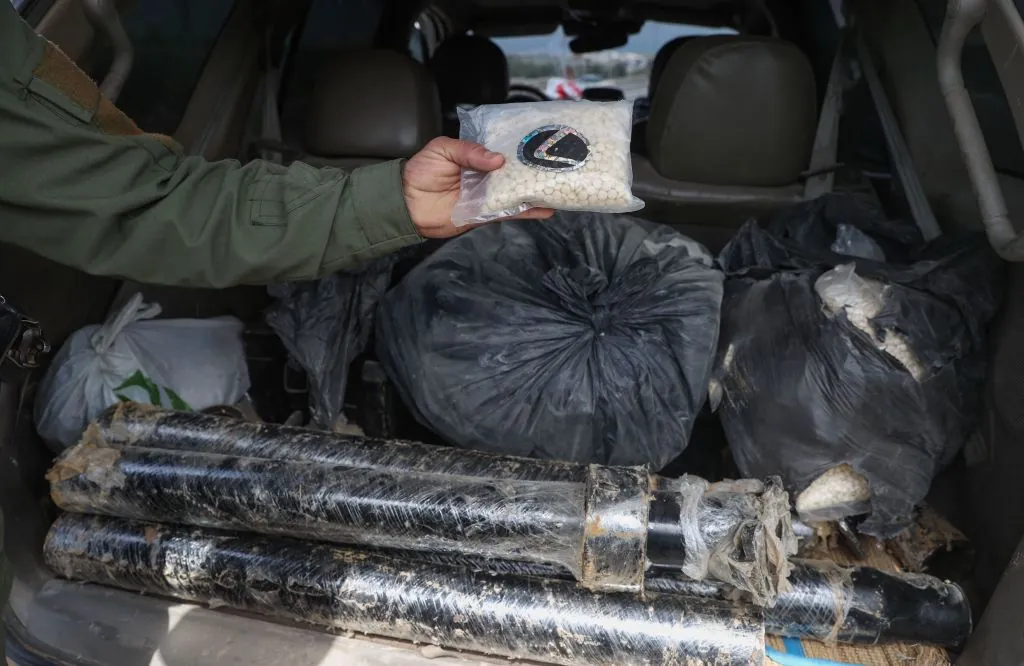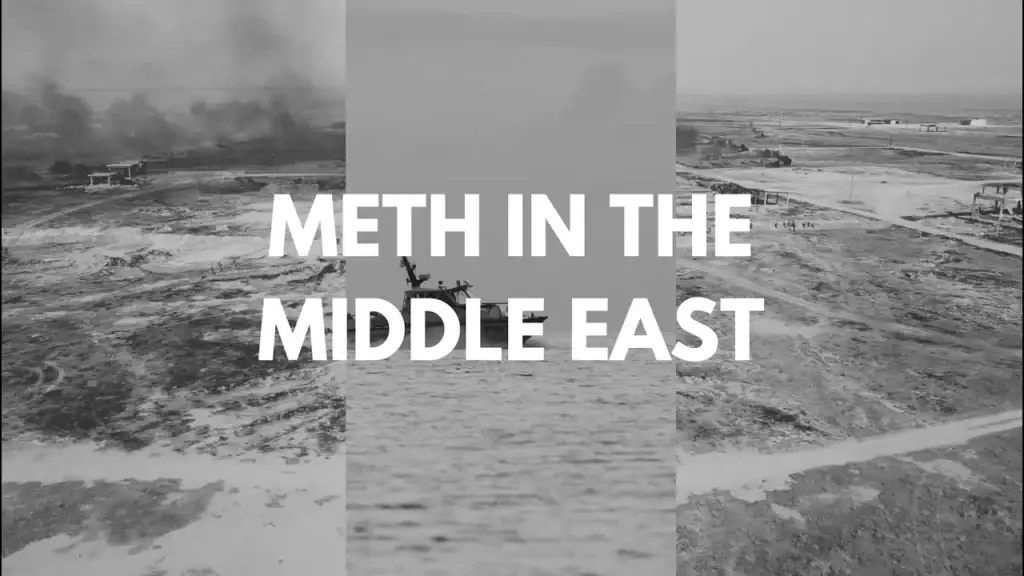
Iraq and Turkey: Two Transit Countries to Watch in the Captagon Drug Trade
The captagon trade continued to evolve in size and scope in 2022. As violent clashes along the Syrian-Jordanian border have intensified, traffickers have advanced their use of creative smuggling materials, exploited governance gaps and insecurity, and deepened criminal networks to ensure pills reached consumers. Over the last three years, the boom in captagon production has incentivized Syrian regime-aligned producers and smugglers to use commercial maritime routes – through access to ports like Latakia – and overland smuggling through Jordan to reach consumption hubs in the Persian Gulf. But regional law enforcement systems have caught on, seeking to increase interdiction capacity at maritime ports, change rules of engagement along borders with Syria, and monitoring shipments with Syrian origins. These new obstacles have forced smugglers to once again adapt.
Recent seizure data compiled by the New Lines Institute on the captagon trade for 2022 reveals that narco-entrepreneurs in Syria are increasingly relying on overland smuggling, carving out new transit countries for the captagon trade and, potentially, new consumer markets. Two countries – Iraq and Turkey – have experienced an uptick in seizures that should ring alarm bells for the U.S., the EU, and their regional partners. The spillover of the captagon trade into these countries signals the fast-paced adaptability of smugglers as they recognize capacity-building efforts in the region. It also indicates a broader scope of captagon smuggling networks beyond the Syrian regime and Hezbollah, with the involvement of Iran-aligned militias in Iraq and criminal networks in Turkey.
Using Iraq to Reach the Gulf and New Consumers
One of the biggest objectives of captagon producers in Syria has been finding ways to transport the drug cheaply and undetected to consumer hubs in the Persian Gulf. Until 2022, smugglers relied heavily on maritime shipping through the Mediterranean and Red Sea and overland routes through Jordan and into Saudi Arabia. But recently, Saudi Arabia has sought to increase its detection capacity at overland border crossings with Jordan and maritime ports. Jordan followed suit after a string of violent smuggling incidents after it opened the Jaber-Nassib border crossing in September 202, loosening its rules of engagement to prevent smugglers from crossing and threatening Jordanian Armed Forces patrols. This has put captagon traffickers in a bind, but they have not been without options, particularly eastward where Iraq serves as a useful alternative for pills to reach Gulf markets.
Iraq presents an alternative land bridge for captagon to reach popular consumer hubs in the Arab Gulf as well as prime conditions under which the captagon trade can thrive. Fragmented governance and widespread corruption in Iraq, coupled with deepened Iranian influence amongst armed groups, has shaped the country’s checkpoint economy – fertile ground for the captagon trade. Iran-aligned militias in the Popular Mobilization Forces (PMF), a key security partner of the Syrian regime and its 4th Division forces, have extensive influence over Iraq’s checkpoint economy and relative control over key chokepoints such as the Al-Qaim region and Shalamcheh crossing in Basra, making them a natural partner in captagon trafficking. Recent seizures of captagon in Jordan and Kuwait have identified Iraq as a transit country. Additionally, Iraq’s fragmenting political landscape, fragile security situation, and unstable economic outlook have created fertile ground for high rates of captagon consumption, particularly among Iraq’s youth. Captagon’s emergence in Iraq follows an uptick in consumption of crystal meth, tramadol, and other substances among local populations in recent years. The spokesman for the Ministry of Interior’s Anti-Narcotics Directorate, Col. Zeyad al-Qaisi, remarked in 2021 that drug consumption in the country is reaching new heights, saying Iraq has transformed from a crossing point for narcotics trade into a consumption hub with serious implications for Iraqi security and public health.
While there previously have been a handful of captagon seizures in Iraq, 2022 saw a spike in the frequency and size of captagon interceptions. Most seizures occurred in areas in and around the Iraq-Syria border and in the Anbar governate, such as Rutba, Al Qaim, and Ramadi. Smugglers also increased their use of advanced smuggling tactics, hiding pills inside carcasses of dead sheep near Al-Qaim, a “homemade gyroplane” that flew pills over a border area near Basra, and hidden among produce such as orange crates seized along the Baghdad-Fallujah roadway and a vegetable truck seized along the Al-Qaim highway.
However, one incident on the outskirts of Baghdad signaled that Iraq had become more than a transit country. On April 30, 2022, Iraq’s National Security Service raided a large warehouse in the suburbs of Baghdad that contained captagon pills inside flour bags, industrial cartons, and duffle bags and detained a large-scale criminal network that the National Security Service said included four “Arab nationalities” in addition to Iraqi citizens. The presence of a large-scale warehouse indicated smugglers were creating new facilities to store industrial-sized shipments far from the border, with the help of Iran-aligned militias, to trickle down into to the local market and ship to major regional consumption hubs.
Using Turkey to Reach Europe and Expand Demand
Turkey is no stranger to the captagon trade, having experienced an uptick in trafficking during the early 2000s when the market for the drug shifted from the Balkans to the Levant. Turkey’s proximity to the Balkans and its many illicit networks are a geographical advantage for captagon smugglers to reach new consumption markets. However, a combination of law enforcement crackdowns and the closure of the border with wartime Syria reduced captagon smuggling in the late 2010s and early 2020s.
Data for 2022 and 2023 indicates smugglers are seeking to utilize Turkey once more. When producers began making captagon on an industrial scale, they smuggled their wares using maritime ports along the Mediterranean to dispatch and reroute shipments to destination markets in the Arab Gulf. Many smugglers – particularly those aligned with the Syrian regime – were able to easily access government ports, state resources, shell companies, and transportation networks in order to transport large shipments of captagon. A wave of high-profile seizures along southern European ports and investigative reports between 2019 and 2021 have increased law enforcement systems’ operational awareness of smugglers’ tactics, and in response, smugglers have changed tack, using overland routes through Turkey as a land bridge to reach trafficking networks and potentially expand consumption markets.
Many captagon interceptions in 2022 were conducted in Turkish cities either close to the Turkish-Syrian border or on the periphery of Istanbul, often involving civilian vehicles or commercial trucks and including larger shipments of captagon than in previous years. The country seized its largest captagon shipment to date, intercepting 12.3 million pills at its Ambarli Port and arresting a foreign national. Overland, captagon shipments have been seized from smugglers transporting a notable number of pills in car trunks and commercial trucks, with seizures in Istanbul in April and August, at the Bab al-Hawa border crossing with Syria, and in Konya, Antakya, and Mersin. Many incidents involved car chases with law enforcement, such as one in Kahramanmaraş Province and one on the Antakya-Iskenderun roadway.
Smugglers have also made use of Turkish airports to reroute captagon to destination markets in the Gulf by air, with an array of seizures across the Middle East where customs systems have cited Turkey as a transit country. Kuwait cited Turkey as a transit route in two seizures in 2022: on June 23 when Kuwait’s International Airport seized an air cargo shipment of 4 million pills hidden in thermal packaging machines, dispatched by a Syrian expatriate from Istanbul’s International Airport and on Sept. 9 when customs intercepted 25,000 pills hidden inside a coffee machine package dispatched from Turkey.
There continues to be no major evidence of European consumption of captagon. However, traffickers’ increasing use of Turkey is a sign that smugglers are continuing to eye Europe as an enduring transit route and potential consumer market. Following a seizure of 2 million pills that appeared to be the “Lexus” variant of captagon in Mersin’s Hal Complex Junction, Turkish law enforcement announced that the pills, which originated in Syria, were intended for “European countries,” although authorities did not specify a country or recipient. While there is little evidence of a concrete consumer market, criminal networks with strong ties to the captagon trade are present in Europe. A string of seizures, warehouse busts, and arrests in Germany, Greece, Austria, Romania, and Italy since 2019 revealed that Syrian and Lebanese narco-entrepreneurs have incrementally been expanding their foothold in the EU, forging partnerships with local criminal groups such as the Naples-based mafia and the Camorra or even directly establishing shell companies and illicit networks to smuggle captagon.
As the Trade Evolves, So Must Interdiction
The uptick in captagon flows into Turkey and Iraq should draw concern from the U.S. and its partners, signaling the expansion of the trade in both geographic scope and illicit networks. The captagon trade’s agents have a considerable role in shaping new demand markets through transit routes, exploiting nearby governance gaps and unstable landscapes to create new opportunities for the trade to thrive.
The U.S. and partners must evolve their understanding of the captagon threat. To counter the trade, policymakers should step outside of the framework of the captagon trade as a Syria-centric challenge or solely a Middle Eastern trade and understand the breadth of participatory actors in addition to those aligned with the Assad regime.
Through the passage of a National Defense Authorization Act amendment the Captagon Act, Washington is to assemble an inter-agency strategy disrupting narcotics flows as it relates to the Syrian Assad regime. However, as the trade grows in size, network, and geographic scope, Washington will need to build upon this strategy to effectively stem its regional implications. It’s pivotal that the U.S. and its partners in the EU and Middle East create a platform for intelligence-sharing, laboratory testing, communicating best practices for demand reduction, and other necessary information as a part of a mechanism to manage the captagon trade. Additionally, the U.S. and its partners should seek to increase accountability for malign state and non-state actors capitalizing on the captagon trade, such as the Syrian regime and Iran-backed militias, and expose these actors’ involvement in manufacturing and trafficking.
The views expressed in this article are those of the author and not an official policy or position of the New Lines Institute.




